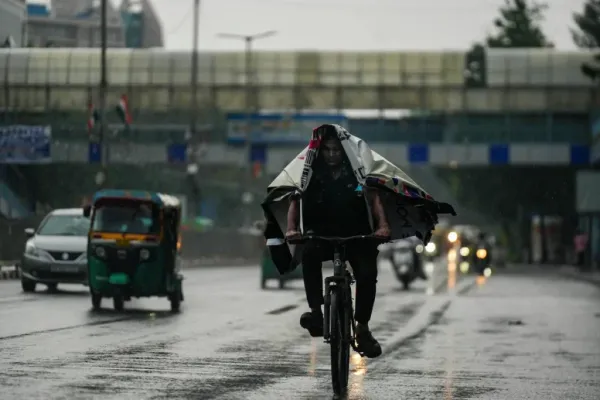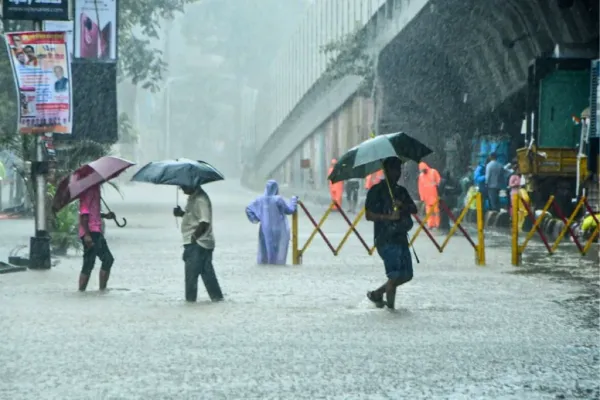Union home minister Amit Shah on Wednesday introduced a bill seeking to amend the Constitution to provide a legal framework for the removal of the prime minister, chief ministers and ministers arrested on serious criminal charges for 30 days, drawing fierce protests from the Opposition.
The bills have proposed that if the PM, ministers or CMs are arrested for 30 consecutive days for offences that attract a jail term of at least five years, they will lose their job on the 31st day. Along with the Constitution (130th amendment) Bill, Shah also introduced two other bills for extending this amendment to UTs and J&K. The draft laws were referred to a joint committee.
The battle lines were drawn when the House resumed at 2 pm.
Trouble broke out when Trinamool MPs started protesting in the well and charged towards Shah when he introduced the three draft laws. In the melee, Trinamool's Kalyan Banerjee was seen trying to tug at the microphone in front of Shah and shouting slogans.
This led to angry BJP members charging towards the Opposition MPs, with Union minister Ravneet Singh Bittu rushing to the aisle and parliamentary affairs minister Kiren Rijiju moving to stand next to the home minister, gesturing to the Opposition members to step back.
Tempers ran high with copies of the bills being torn and flung at Shah as he stood in his seat to speak. The bills were opposed by Congress MPs KC Venugopal, Manish Tewari and AIMIM's Asaduddin Owaisi.
When KC Venugopal raised the issue of Shah's arrest while he was Gujarat's home minister and asked about his claim of morality, the BJP leader said he had resigned on moral grounds before his arrest and joined the government only after being discharged by the court. "We cannot be so shameless that we continue to occupy constitutional positions while facing serious charges," Shah said. Sources said Shah didn't assume public office till the time he was acquitted in 2015. They said LK Advani also maintained high moral grounds.
When the House resumed at 3 pm, marshals came into the Lok Sabha before the start of the proceedings. Amid repeated disruptions, the three bills were passed by a voice vote and it was resolved to refer it to a joint committee of Parliament. The panel has been mandated to submit its report by the last day of the first week of the next session.
Amid the continuous noisy protests, the House was adjourned till 5 pm as Speaker Om Birla repeatedly asked the opposition members to take their seats and maintain the dignity of the House.
According to the bill, there is no provision under the Government of Union Territories Act, 1963 (20 of 1963) for the removal of the chief minister or a minister arrested and detained in custody on account of serious criminal charges. Hence, there is a need to amend section 45 of the Government of Union Territories Act, 1963, to provide a legal framework for the removal of a chief minister or a minister in such cases.
The bills have proposed that if the PM, ministers or CMs are arrested for 30 consecutive days for offences that attract a jail term of at least five years, they will lose their job on the 31st day. Along with the Constitution (130th amendment) Bill, Shah also introduced two other bills for extending this amendment to UTs and J&K. The draft laws were referred to a joint committee.
The battle lines were drawn when the House resumed at 2 pm.
Trouble broke out when Trinamool MPs started protesting in the well and charged towards Shah when he introduced the three draft laws. In the melee, Trinamool's Kalyan Banerjee was seen trying to tug at the microphone in front of Shah and shouting slogans.
This led to angry BJP members charging towards the Opposition MPs, with Union minister Ravneet Singh Bittu rushing to the aisle and parliamentary affairs minister Kiren Rijiju moving to stand next to the home minister, gesturing to the Opposition members to step back.
Tempers ran high with copies of the bills being torn and flung at Shah as he stood in his seat to speak. The bills were opposed by Congress MPs KC Venugopal, Manish Tewari and AIMIM's Asaduddin Owaisi.
When KC Venugopal raised the issue of Shah's arrest while he was Gujarat's home minister and asked about his claim of morality, the BJP leader said he had resigned on moral grounds before his arrest and joined the government only after being discharged by the court. "We cannot be so shameless that we continue to occupy constitutional positions while facing serious charges," Shah said. Sources said Shah didn't assume public office till the time he was acquitted in 2015. They said LK Advani also maintained high moral grounds.
When the House resumed at 3 pm, marshals came into the Lok Sabha before the start of the proceedings. Amid repeated disruptions, the three bills were passed by a voice vote and it was resolved to refer it to a joint committee of Parliament. The panel has been mandated to submit its report by the last day of the first week of the next session.
Amid the continuous noisy protests, the House was adjourned till 5 pm as Speaker Om Birla repeatedly asked the opposition members to take their seats and maintain the dignity of the House.
According to the bill, there is no provision under the Government of Union Territories Act, 1963 (20 of 1963) for the removal of the chief minister or a minister arrested and detained in custody on account of serious criminal charges. Hence, there is a need to amend section 45 of the Government of Union Territories Act, 1963, to provide a legal framework for the removal of a chief minister or a minister in such cases.





